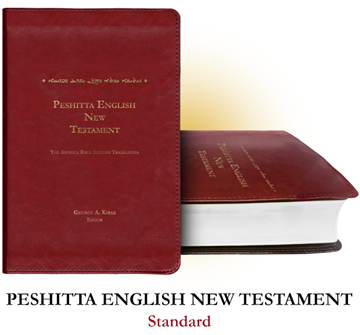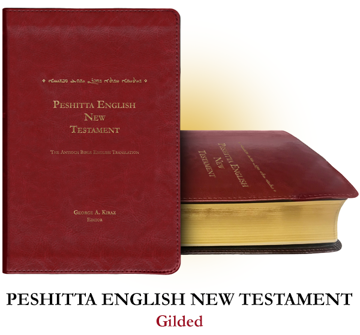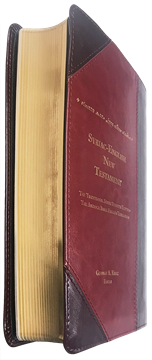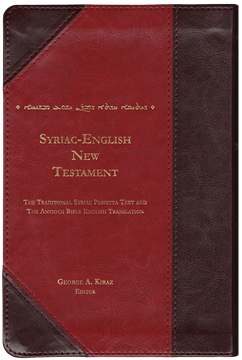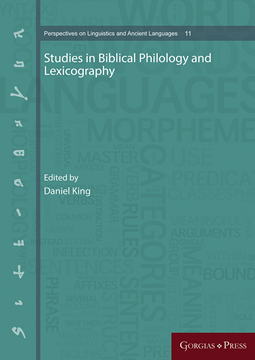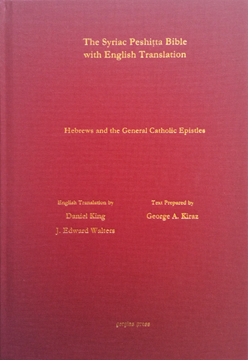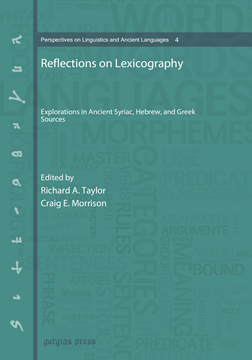Daniel King

Daniel King (Translation Consultant, SIL International and Associate Fellow, Cardiff University) specializes in Greek-Syriac translations in Late Antiquity, and especially in Syriac philosophy. He has published on the Syriac reception of Aristotle, John Philoponus, and Cyril of Alexandria. He is the author, inter alia, of The Syriac World (Routledge, 2019) and The Earliest Syriac version of Aristotle’s Categories (Brill, 2010).
A History of the Study of Grammar among the Syrians
An English translation of Historia artis grammaticae apud Syros
By Adalbert Merx; Translated by Daniel King
ISBN: 978-1-4632-4197-1
An English translation of a Latin work on the Syriac grammatical tradition ('Historia artis grammaticae apud Syros') by the 19th-century German theologian and linguist, Adalbert Merx.
$95.00 (USD) $57.00 (USD)
Peshitta English New Testament
The Antioch Bible English Translation
General Editor George Anton Kiraz; Translated by Jeff W. Childers, J. Edward Walters, Daniel King & Robert A. Kitchen
ISBN: 978-1-4632-4213-8
After the success of the Antioch Bible, this publication is a new translation of the Peshitta English New Testament in a single volume. The English translations of the New Testament Syriac Peshitta were carried out by an international team of scholars. The volume is also available in a beautiful gilded leather edition (ISBN 978-1-4632-4217-6).
From $25.00 (USD)
Peshitta English New Testament (Gilded)
The Antioch Bible English Translation
General Editor George Anton Kiraz; Translated by Jeff W. Childers, J. Edward Walters, Daniel King & Robert A. Kitchen
ISBN: 978-1-4632-4217-6
After the success of the Antioch Bible, this publication is a new translation of the Peshitta English New Testament in a single volume. The English translations of the New Testament Syriac Peshitta were carried out by an international team of scholars.
From $40.00 (USD)
Syriac-English New Testament (Gilded)
The Traditional Syriac Peshitta Text and the Antioch Bible English Translation
General Editor George Anton Kiraz; Translated by Jeff W. Childers, J. Edward Walters, Daniel King & Robert A. Kitchen
ISBN: 978-1-4632-4191-9
After the success of the Antioch Bible, this publication is a new, historic edition of the Syriac-English New Testament in a single, very special, gilded volume. The English translations of the New Testament Syriac Peshitta along with the Syriac text were carried out by an international team of scholars.
From $44.95 (USD)
Syriac-English New Testament
The Traditional Syriac Peshitta Text and the Antioch Bible English Translation
General Editor George Anton Kiraz; Translated by Jeff W. Childers, J. Edward Walters, Daniel King, Robert A. Kitchen, Jerome Alan Lund & James Prather
ISBN: 978-1-4632-4160-5
After the success of the Antioch Bible, this publication is a new, historic edition of the Syriac-English New Testament in a single volume. The English translations of the New Testament Syriac Peshitta along with the Syriac text were carried out by an international team of scholars. NOTE: If you meant to order the beautiful gold gilded edition of this book, rather than the standard format, please see the link in the Overview text below.
From $30.00 (USD)
Studies in Biblical Philology and Lexicography
Edited by Daniel King
ISBN: 978-1-4632-4035-6
This volume offers papers that emerged from the meeting of the International Syriac Language Project (ISLP) which took place at Stellenbosch University, South Africa, in September 2016, and at the Humboldt-Universität zu Berlin, in August 2017. The ISLP invites research not only into Syriac, but extends its range to all ancient language lexicography. Hence its proceedings enrich the whole field of Syriac, Hebrew, and Greek lexicography. The ISLP especially encourages research into the interfaces between these languages, and hence the current volume contains a number of papers on translation equivalence: Hebrew-Greek, Hebrew-Syriac, and Greek-Syriac. Other philologically focused pieces explore matters relating to textual and manuscript traditions. All of these are preceded in the present volume by an extensive review of the production and achievements of the ISLP to date.
$149.00 (USD) $89.40 (USD)
Hebrews & General Epistles According to the Syriac Peshitta Version with English Translation
Series: Surath Kthob 32
ISBN: 978-1-4632-0556-0
This volume is part of a series of English translations of the Syriac Peshi?ta along with the Syriac text carried out by an international team of scholars.
$150.00 (USD) $90.00 (USD)
Reflections on Lexicography
Explorations in Ancient Syriac, Hebrew, and Greek Sources
Edited by Richard A. Taylor & Craig E. Morrison
ISBN: 978-1-4632-0229-3
Colloquia of the International Syriac Language Project. These essays offer a probing analysis of selected lexical tools and methods for working with ancient Syriac, Hebrew, and Greek sources, as well as offering reflections on methodological concerns for lexicographical tools of the future.
$183.00 (USD) $109.80 (USD)
Romans and Corinthians 1/2 According to the Syriac Peshitta Version with English Translation
English Translation by Daniel King; Text Prepared by George Anton Kiraz
Series: Surath Kthob 33
ISBN: 978-1-61143-963-2
This volume is part of a series of English translations of the Syriac Peshitta along with the Syriac text carried out by an international team of scholars.
$150.00 (USD) $90.00 (USD)
Journal for Late Antique Religion and Culture
ISBN: 978-1-4632-0052-7
The Journal for Late Antique Religion and Culture (JLARC) is a peer-reviewed open access online journal edited by members of the Cardiff Centre for Late Antique Religion and Culture (CLARC) and published by Cardiff University (http://www.cardiff.ac.uk/clarc).
$50.00 (USD) $30.00 (USD)
Journal for Late Antique Religion and Culture
ISBN: 978-1-4632-0147-0
The Journal for Late Antique Religion and Culture (JLARC) is a peer-reviewed free-access online journal edited by members of the Cardiff Centre for Late Antique Religion and Culture (CLARC) and published by Cardiff University (http://www.cardiff.ac.uk/clarc).
$42.00 (USD) $25.20 (USD)
Journal for Late Antique Religion and Culture
ISBN: 978-1-4632-0148-7
The Journal for Late Antique Religion and Culture (JLARC) is a peer-reviewed free-access online journal edited by members of the Cardiff Centre for Late Antique Religion and Culture (CLARC) and published by Cardiff University (http://www.cardiff.ac.uk/clarc).
$49.00 (USD) $29.40 (USD)
Journal for Late Antique Religion and Culture
ISBN: 978-1-4632-0149-4
The Journal for Late Antique Religion and Culture (JLARC) is a peer-reviewed free-access online journal edited by members of the Cardiff Centre for Late Antique Religion and Culture (CLARC) and published by Cardiff University (http://www.cardiff.ac.uk/clarc).
$57.00 (USD) $34.20 (USD)


